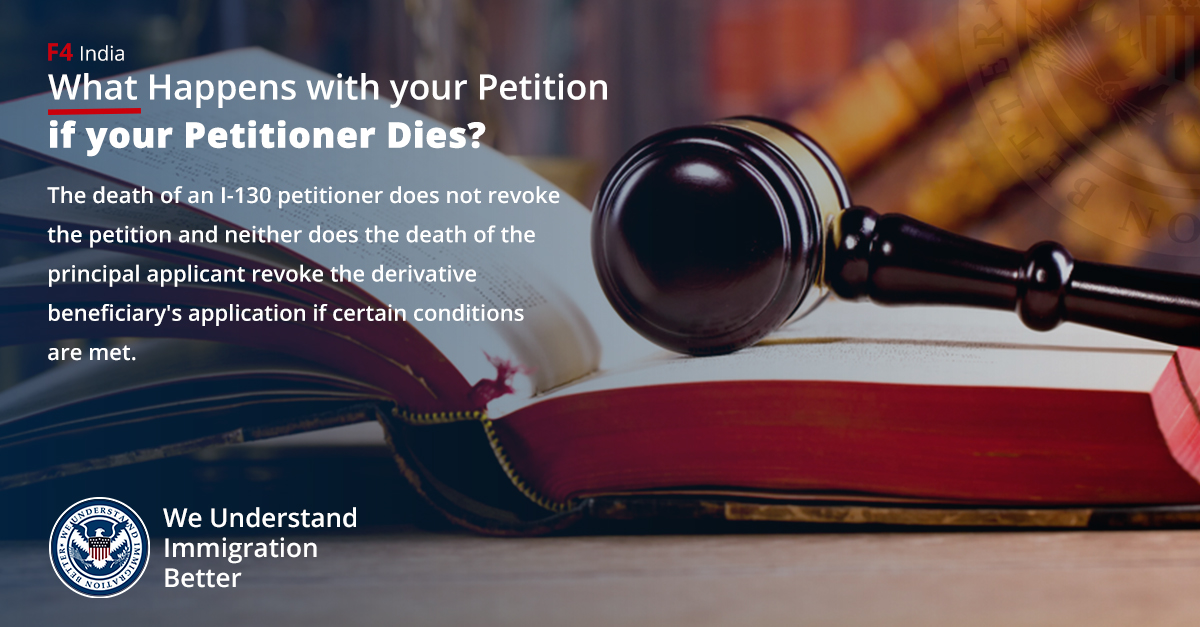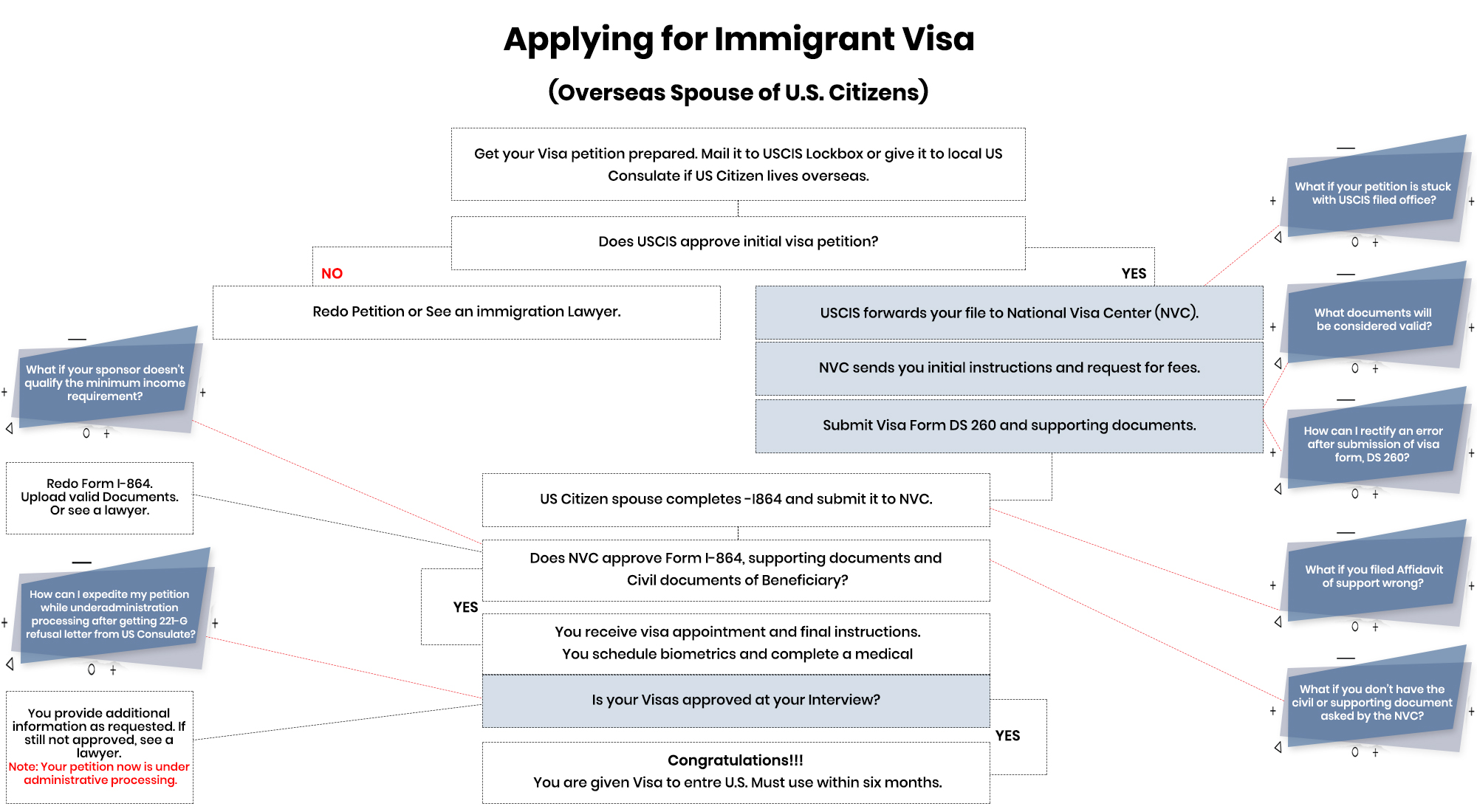Humanitarian Reinstatement (I-130 Petition Reinstatement due to Death of Petitioner )

Humanitarian Reinstatement is one of the most complex immigration matters, and it is understandably daunting to go through this process on your own. That’s why you should get legal support as you move forward. At F4 India, our attorneys have the exclusive experience and the highest success rate in the grant of Humanitarian reinstatement for immigrant visa petitions. We have been practising in this area of law for many years, gaining deep insight, experience, and skills to effectively handle humanitarian-based cases, especially where the petitioner or principal applicant died, and your petition is revoked. With all of this backing from our team of attorneys, you can be assured that you are in excellent hands when you work with us.
Our immigration Team is ready to help you, no matter how challenging your immigrant case is. We want to help you achieve your U.S. immigration goals efficiently and effectively. In addition, our firm reunites those living abroad with relatives in the United States. In short, we are an immigration firm with a mission to provide our clients with the highest quality U.S. immigration services.
Humanitarian Reinstatement
Unfortunately, petitioner died and your petition has been revoked by the USCIS, the first thought that appear to your mind is that your petition is no more valid now and your dream and efforts you made to move to the US and to get reunite with your family members have shattered. but that’s not the case, you still have chance to immigrate and get green card on your existing approved or even revoked petition. Wondering How? Contact us to know all the procedure and to get answers to the following questions.
The Most Common Questions Asked for Humanitarian Reinstatement
What Happens with your Petition if your Petitioner /Principal Applicant Dies?
Suppose the Petitioner/ Sponsor or Principal applicant / Beneficiary dies and the case is at US Consulate or NVC Service Centre. In that case, the case file will be returned to the USCIS to Revoke the Petition.
What is the Requirement to Qualify for Humanitarian Reinstatement?
Whether you are eligible for Humanitarian reinstatement or not can be best defined only after the case analysis, as every case is different and have different circumstances. To get your case analysis to check eligibility for filling humanitarian reinstatement of your visa petition, you are advised to contact our Attorney at +91-6283507748; you can also write us at info@f4india.com. Basic consultation on the phone is free, but for detailed analysis, you have to pay a minimal charge and provide all required documents suggested by the Attorney. The procedure and requirements of USCIS for Humanitarian reinstatement of your visa petition are different for applicants who have chosen adjustment of status and for applicants whose petition is processed through Consular Processing. You can better understand it through one of the requirements mentioned below for applicants whose petition was adjudicated through Adjustment of Status.
Residence Requirement for Qualifying Beneficiaries, under Adjustment of Status processing
To qualify for this protection, the beneficiary of a pending or approved I-130 petition must have resided in the U.S. when the qualifying relative died and must continue to reside in the U.S. on the date the decision on the pending petition or application is made. This does not mean that the beneficiary must have been physically present in the U.S. when the qualifying relative died, but simply that the beneficiary’s actual residence was in the U.S. Additionally, if any one of the beneficiaries of a petition meets this residence requirement, then all the beneficiaries meet it as well. Each beneficiary doesn't need to meet the residence requirement on their own. Therefore, if the principal beneficiary has died, the petitioner may continue to seek approval of the petition so long as at least one derivative beneficiary meets the residence requirements. However, note that this does not give derivative beneficiaries any right to the petition. The petitioner retains the right to withdraw the petition at any time. Suppose an alien has obtained an adjudication of a petition under this new provision of the INA but does not qualify for adjustment of status. In that case, he or she may leave the U.S. to undergo consular processing.
`Who is Eligible to fill the Affidavit of Support after Deceased Petitioner?
The death of the qualifying relative does not relieve the alien beneficiary of the requirement to have a sponsor file the Affidavit of Support on Form I-864. Therefore, if the sponsor on the Affidavit of Support dies, another individual who qualifies as a “substitute sponsor” must submit a Form I-864 under INA § 213A.
Motion to Reopen a Humanitarian Reinstatement in Case of a Denial.
For petitions or applications that were denied due to the death of either the petitioner or the principal beneficiary, the surviving beneficiary may file an untimely motion to reopen with the appropriate filing fee and request that the pending petition or application be adjudicated
What is the Time Line for Humanitarian Reinstatement?
There is no specific timeline for humanitarian Reinstatement of your visa petition. But as we have filled many humanitarian reinstatements for revoked petitions, based on our experience, we can say that the timeline for this could be between 12 to 16 months, depending on the case type and its complexity. In many cases, USCIS ask for more evidence or supporting documents.
What Factors Contribute to a High Success Rate in Humanitarian Reinstatement Cases?
The likelihood of success in humanitarian reinstatement cases is influenced by several key factors. Fundamental considerations include the status of your visa petition at the time of the petitioner's death or the hardships faced by the U.S. citizen. Complex determinants for a favourable outcome hinge on the prevailing immigration laws governing humanitarian reinstatement and the specific circumstances surrounding your visa petition and family situation.
Achieving a high success rate demands an in-depth understanding of the intricate factors associated with humanitarian reinstatement, requiring the expertise of a experienced attorney. Only a legal professional well-versed in humanitarian petitions can discern the most pertinent and accurate factors that may lead to a successful outcome – namely, the approval from the U.S. Citizenship and Immigration Services (USCIS) for the humanitarian reinstatement of your visa petition.
Why do you need an Immigration Attorney to help you Prepare for Humanitarian Reinstatement of your Visa Petition?
To avoid running into unnecessary trouble, it is a good idea to hire an immigration attorney when applying for your Humanitarian Reinstatement. Keep in mind that, each year, USCIS rejects or denies thousands of petitions. This could be your last chance to get your visa petition to reinstate and immigrate to the United States.
An attorney will do the following tasks in order to make your case stronger for approval
Just Remember that "a good attorney can be the difference between an approval and a denial, and it's always better to get it right the first time."
Humanitarian Reinstatement Success: Reuniting Families Despite Challenges
A client approached our office with a case spanning four years. Her father, a U.S. citizen, had filed a relative petition for her in September 2006 under the F3 category, "married daughter of a U.S. Citizen." The USCIS approved the petition in 2010, initiating a prolonged wait for a visa.
Tragically, several years after the petition approval, the client's father passed away before she could obtain her F3 immigrant visa. Consequently, when her visa became available in August 2018, the USCIS revoked its initial petition approval. Seeking assistance, our client explained that her mother, also a U.S. citizen, remained in the United States and needed her daughter by her side to care for her in her advanced age and declining health. Recognizing the potential for humanitarian relief, we assured our client that we could help her apply for humanitarian reinstatement, drawing confidence from our past successes in similar cases.
Humanitarian reinstatement is an option for beneficiaries of approved relative petitions if the petitioner dies after the approval. In our client's case, we filed a Request for Humanitarian Reinstatement with USCIS. We engaged in a prolonged advocacy effort, presenting a compelling case for the reinstatement by filing numerous affidavits and supporting documents. Our attorney personally appeared multiple times with senior USCIS officers, emphasizing the long history of the principal applicant's mother's illness and the loss of her primary caretaker, our client's father. Additionally, we argued that the principal applicant's mother's sister, a U.S. citizen, was qualified to be the financial sponsor, serving as a substitute for the deceased petitioner.
After a year-long struggle with USCIS, our Humanitarian Reinstatement case was approved, and our client's visa application was reinstated. With her visa now available, she anticipates reuniting with her mother in the United States in 2021, accompanied by her husband and children.
Samar Sandhu, the founder of F4 India Law Firm, leads a team that assists clients with various family immigration cases. Our offices in Mohali, Punjab, India, and Vancouver, BC, Canada, cater to clients seeking experienced immigration attorneys. To explore how our team can assist with your case, please contact our firm today.
One of The Success Stories
Achieved success in getting a green card application approved by USCIS under Humanitarian grounds even after the death of the U.S. petitioner (sponsor).
Case Time Line
Petition: I-130
Category: F3
Priority date: September 8, 2006
Approval Date: August 26, 2010
Petitioner Died: in November 2017
Client approached our team of F4 India: January 2018
Case update at NVC and USCIS and US team discussion: Action started in February 2019
Case filed by f4 India at USCIS: May 2019
Case Approved, got Decision letter: March 2020

